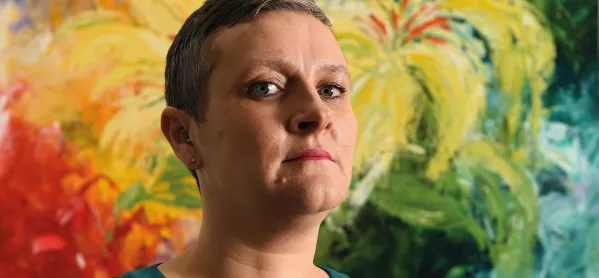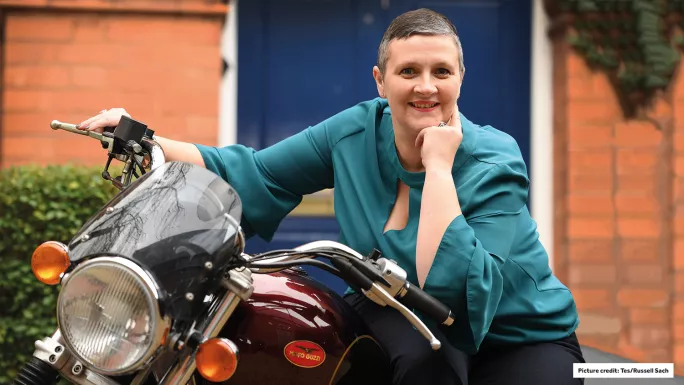
- Home
- Gwen Byrom profile: ‘The stereotype of what an independent school is doesn’t help anybody...’
Gwen Byrom profile: ‘The stereotype of what an independent school is doesn’t help anybody...’

This profile was first published in Tes magazine on 26 January 2018.
Gwen Byrom does not fit the image of an independent girls’ school headteacher.
She was educated at a council estate comprehensive, has five children and a house husband, and can be seen riding her 1,100cc Moto Guzzi motorbike around the roads of Loughborough whenever she manages to get some free time. “People have said to me, ‘You are not what we expected of a head of a private school’. And, I don’t know, I sort of quite like that,” admits the head of Loughborough High School.
This month, Byrom began her new role as president of the Girls’ Schools Association, representing the heads of more than 150 independent girls’ schools across the country. And she is hopeful that her unconventional persona will help to challenge some stereotypes - which she says are a particular “bugbear” - about the independent sector and its leaders.
“If you were to close your eyes and imagine what an independent school looked like, you wouldn’t necessarily imagine this,” she says of herself. “There may be a definite image in your head of what the school was and what the head looked like, and we are all very different to that.”
Her simply decorated office at Loughborough would certainly not look out of place in a state school. It is neither grand nor showy.
“The stereotype of what an independent school is doesn’t help anybody,” she continues. “It doesn’t help us. It doesn’t help people who would maybe want to come and engage with us. It doesn’t help us in engaging with the maintained sector and forging partnerships.”
Eye on social mobility
In her new role, Byrom is keen to boost social mobility. But she recognises the limits of how much the independent sector can do. Last month, Byrom said she wanted to get more disadvantaged children to consider applying for bursaries at independent schools. But she added that it can be difficult to attract applications from families who are worried their children may be put in an uncomfortable position or feel out of their depth.
In the 1980s, Byrom would herself have been eligible for the Assisted Places Scheme, which provided children with a free or subsidised place in an independent school. But her parents - a dairy labourer and a housewife - still chose what she describes as a “bog-standard comprehensive”.
“I don’t know if we would have put ourselves forward for it because of those social and psychological barriers,” she admits. “I think they [her parents] would have wanted to have more of a conversation about it. They would have wanted to understand it.”
It was at the mixed comprehensive school in Hull that Byrom was inspired to study sciences at A level and then at university - thanks to a dedicated chemistry teacher who saw her potential. “Lots of people talk about the teacher that was the one that helped to define for them what they were going to do, or helped them to see their way forward, and I think he was probably mine,” she says. “He was fabulous.”
Byrom was the only female in her physics A-level class - and she was significantly outnumbered in her maths class - but it didn’t put her off pursuing a science degree and a job in research. But despite a love of science, she quickly found that a career in research wasn’t right for her. “I needed more human contact,” she recalls. “It just wasn’t making me happy.”
It was only when she was working in Guy’s Hospital, London, that everything fell into place: she got in touch with a colleague’s father - a teacher - and spent some time teaching in inner-city schools. Despite her state school education, Byrom has spent the past 18 years working in independent schools across the country. “It was probably more by accident than design,” she says.
New adventure
Byrom had been working as a chemistry teacher at the Weald of Kent Grammar School, a girls’ school in Tunbridge, for two years when her first child became very ill shortly after being born. She took a break from teaching for a couple of years - and then when she began to look for a job, she saw that Solihull School, an independent boys’ day school, was looking for a chemistry teacher.
It wasn’t long before Byrom was embarking on a new adventure working as a housemistress at a co-ed boarding school in Shropshire - with four children under the age of 5 and her husband in tow. “The idea of a boarding school was clearly something I had no experience of,” she admits. But with six-month-old twins to look after, the prospect of working from “home” appealed to Byrom.
“I’ve always loved that closeness that you get in a boarding community,” she says, “where you are all together, all the time. That sense of community is fabulous.”
Although Byrom had not experienced the boarding school environment before taking on the post, her twins - now 15 - have only ever known a home on school grounds. In fact, one of them, Stella, attends Loughborough - just 20 yards from her house. “It is not odd for them,” says Byrom. “Sometimes it can be slightly odd for friends when they come to visit and they are going to the head’s house.”
Sitting in an armchair in her office, Byrom appears pretty laid back for someone with so many responsibilities. There is Buddhist artwork on the theme of tranquillity on the walls, and the only things pinned to the noticeboard are thank-you cards and family photos.
But she admits that there are always “challenges” to juggling five children and a busy job. And looking at how women can best be supported into leadership roles will be a priority for Byrom this year.
Despite her success in combining a big family with a successful career, she remains acutely aware of the obstacles that can be placed in the way of women.
“I think the one thing that I have occasionally been asked [during an interview], and I have wondered whether it would have been asked of other candidates, is ‘How are you going to manage your family?’ I am not always 100 per cent convinced that is a question asked of everybody,” she says.

“I don’t know whether the traditional feelings about how men and women work within a family unit sometimes get in the way of women saying, ‘Well, I will take that step.’ But I don’t think it should be a barrier. I think some of it is about positive role-modelling.”
The headmistress - whose youngest child is just two years old - could be seen as a role model herself. She has eschewed the traditional family unit to pursue school leadership. Twelve years ago, Byrom and her husband, Andy - who used to teach design and technology - decided that one of them should stay at home to look after their children. Andy was willing to step back from teaching and take “the lion’s share of childcare”, she says.
And then their youngest son, Bertie, came along. “It was interesting,” she laughs, “to have a period of maternity leave as a head.”
Byrom was still running Loughborough High when she was more than 38 weeks pregnant: “I was fairly gargantuan at that stage and not moving very fast.” And she returned to school after only taking the summer term and summer holiday off.
Even during her maternity leave, Byrom was determined to keep up to speed with school life. “Because I live there [she points out of the window to her house] it was very easy to stay in touch,” she says. “I was still coming in for governors’ meetings and social events, so I managed to keep a toe in the water.”
It is clear that Byrom loves the job and the “oddness” of school life too much to stay away.
When asked for her career highlight, she recalls sitting in her office a few years ago on a “horrible wet day” and hearing some squealing coming from outside: “I looked out of the window and it was some Year 11s jumping in puddles, just for the sake of it.
“It was just the absolute joy of saying, ‘I’m 16 and I’m going to jump in a puddle because it’s a fun thing to do. That sort of feeling that you have - when some very weird and wonderful things happen, and that’s perfectly normal and that’s just what we do - is brilliant.”
Register with Tes and you can read five free articles every month, plus you'll have access to our range of award-winning newsletters.
Keep reading for just £4.90 per month
You've reached your limit of free articles this month. Subscribe for £4.90 per month for three months and get:
- Unlimited access to all Tes magazine content
- Exclusive subscriber-only stories
- Award-winning email newsletters
You've reached your limit of free articles this month. Subscribe for £4.90 per month for three months and get:
- Unlimited access to all Tes magazine content
- Exclusive subscriber-only stories
- Award-winning email newsletters



